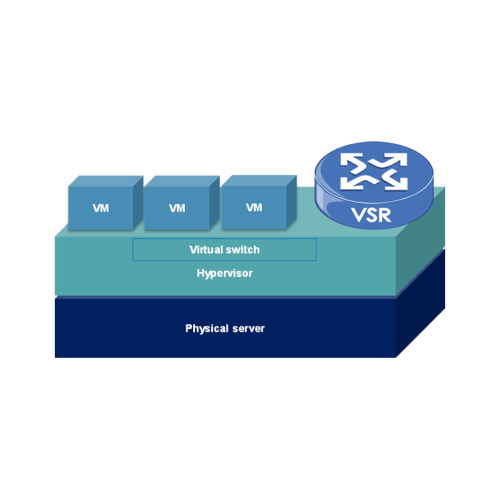
With the growing maturity of virtualization and cloud computing technologies, an increasing number of cloud service providers and telecommunications operators have begun to provide public cloud services. Enterprises can rent resources and services from public clouds as required and create their own virtual data centers (VDCs) or virtual private clouds (VPCs), which saves construction costs and improves service agility for enterprises. As a result, more enterprises have started migrating their applications to public clouds. However, the infrastructure and resources of most public clouds are shared by all tenants, and enterprises cannot deploy their own network devices on public clouds, which brings great networking challenges to enterprises and cloud service providers.
Enterprise branches are typically dispersed in different regions. On traditional networks, enterprises are faced with long construction periods and high manual maintenance costs when deploying network devices and application servers. Hence, they need to simplify branch infrastructure, improve service deployment capabilities, save investment, and simplify maintenance. With migration of applications to the cloud and rapid development of server and virtualization technologies, it has become a trend to provide both network functions and IT applications on a single server.
To follow the industrial trend and address the challenges, H3C has launched a brand-new virtual services router (VSR). Like physical routers released by H3C, the VSR uses H3C's mature Comware network operating system. Running on a standard server virtual machine or bare metal server, it provides features (including routing, firewall, VPN, QoS, and configuration management) and user experience the same as physical routers. It can help enterprises establish secure, unified, and scalable intelligent branches and reduce the quantity and investment on branch infrastructure.
H3C VSR1000 runs on a virtual machine and is a license-controlled software product. Different licenses are available, providing the flexibility for users to select functions, features, and validity periods as needed.
Unlike routers with custom hardware, H3C VSR is a software router that runs on an industrial-standard server VM.
Powerful routing capabilities
The VSR is based on the industry leading Comware 7 platform:
Supports IPv4/IPv6 static and dynamic routing protocols, including RIP/RIPng, OSPF/OSPFv3, IS-IS/IS-ISv6, and BGP/BGP4+.
Supports policy-based routing (PBR) and rich routing policies as well as flexible control, scheduling, and accounting of network traffic, meeting the networking needs of enterprises and operators.
Supports the SR/SRv6 feature that makes the network protocol simple, scalable, programmable and highly reliable, helping customers build a sustainable network.
Ultra-lightweight deployment
The VSR enables ultra-lightweight deployment:
Suitable for deployment in public clouds, accelerating service deployment by virtue of zero transportation and zero cabling.
Supports VMware ESXi, Linux KVM, H3C CAS and other mainstream hypervisors, realizing rapid deployment, batch deployment, image backup, rapid recovery, and flexible migration by giving full play to virtualization.
Provides ISO image, OVA template, IPE, QCOW2 and other release formats to adapt to deployment in various environments.
Ultra-high service elasticity
The VSR provides ultra-high service elasticity:
Allows enterprises to build networks in a virtualized environment and schedules and manages network resources and services on demand. For example, enterprises can flexibly adjust the number and type of network ports according to their needs without purchasing new hardware cards.
Realizes smooth upgrade and device performance improvement as required by dynamically adjusting VM resources and licenses, meeting business growth requirements at any time.
Extending enterprise networks to the cloud
Enterprises can realize the following features by deploying VSRs in public clouds:
Manages the enterprise's VPC network as part of the enterprise network, which ensures consistent network configuration, security policy, management policy, and IP address planning, and realizes unified enterprise network management.
Implements unified traffic control and deploys consistent network services (such as QoS, firewall, load balancing, and WAN optimization) the same as physical routers at enterprise branches and provides consistent network service experience.
Establishes end-to-end VPN connections between the enterprise headquarter and branches and the enterprise VPC to enable more secure access to public cloud applications. Meanwhile, end-to-end access avoids data transit at the headquarter, thus reducing the response time from cloud applications and improving the user experience of cloud applications.
Comprehensive SDN capabilities
Supports management and control protocols such as OpenFlow, telemetry, and NETCONF, and supports management and control by H3C AD-WAN controllers or third-party controllers.
Supports forwarding services such as segment routing, VXLAN, and EVPN, and allows definition of multiple forwarding models to meet different service networking requirements.
Supports SRv6 and EVPN L3VPN over SRv6 policy/BE networking capability.